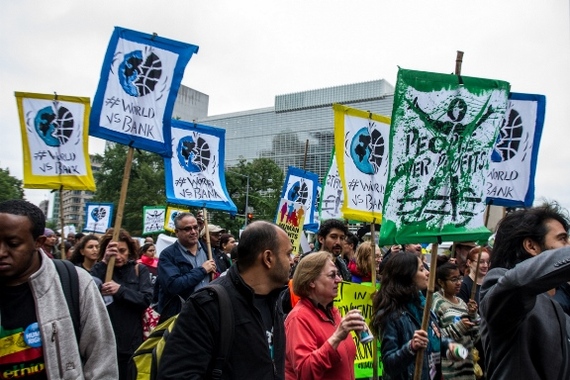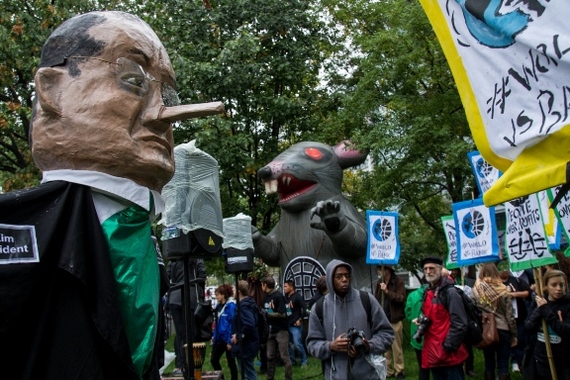
Co-authored with Jolie Schwarz, Legislative Affairs Fellow at Bank Information Center
The FY 2015 Omnibus Appropriations Bill expected to be signed by President Obama this week sends a clear message to the World Bank that its safeguard policies must remain strong in spite of recent efforts to weaken the crucial standards that protect people and the planet from harms caused by development projects. The bill also sets priorities for the U.S. government to fight for at the World Bank Board -- namely, that all dilutions of current policies must be removed and that human rights due diligence should be incorporated into relevant policies.
The World Bank is currently in the process of an unprecedented review of its social and environmental safeguard policies -- many of which were inspired by acts of Congress and U.S. government advocacy over the last few decades. Organizations from the U.S. and around the world have expressed serious concerns on a recent draft of the updated policies released by the Bank, which they perceive as a massive dilution of the current policies. CSOs claim that the new safeguards framework "abandons clear definitions and strict adherence to ex-ante minimum procedural requirements in favor of unlimited discretion by Bank Management." One of those ex-ante requirements is the minimum period for public disclosure of environmental impact assessments, which arose from a now infamous provision of the International Financial Institutions Act, known as the Pelosi Amendment, which requires the U.S. government representative at the World Bank board to withhold support on projects for which an assessment has not been publicly disclosed at least 120 days before a Board vote.

Protesters marching in Washington DC against the new World Bank draft safeguards (Photo credits: Joe Athialy)
The language in the bill suggests that Congress is concerned that its legacy of promoting strong social and environmental standards at the Bank is at risk, including through new policies that would effectively eviscerate the longstanding protections for communities triggered by the Pelosi Amendment. Without such ex-ante requirements, poor communities with little influence over the development agenda in their country now have even fewer opportunities to prevent harmful projects from going forward in their communities, to resist forced displacement or to protect their cultural heritage from destruction.
One of the bill's provisions would require the U.S. representative at the Bank to vote against any project if the applicable social and environmental standards for that project provide less protection than those currently in force at the Bank. The bill also requires the U.S. executive director to encourage the Bank to conduct rigorous human rights due diligence and human rights risk management in connection with its development activities. Typically, those that face the highest risks and suffer the most significant impacts from development projects -- including women, children, persons with disabilities, indigenous peoples, sexual and gender minorities, among others -- are also the most vulnerable to having their human rights violated in the name of development. The language in the omnibus bill makes clear that failing to assess the human rights risks faced by these marginalized and vulnerable communities is no longer acceptable to the United States Congress.

Photo caption: Protesters marching in Washington DC against the new World Bank draft safeguards (Photo credits: Joe Athialy)
This language could prove to be a real headache for the U.S. government which will now have to push back on many new provisions in the draft that specifically have to do with human rights. For example, although the draft incorporates "free, prior and informed consent" (also known as FPIC), which is a key tenant of indigenous people's rights, it would also allow borrowing countries to "opt-out" of applying the Indigenous Peoples standard at all -- including FPIC. In addition, the Bank has failed to articulate how it will operationalize its stated aspirational commitments to human rights in the draft, which notably do not include intentions to conduct human rights due diligence.
The position of the U.S. government on the first draft of the Safeguard policies is expected to be made public sometime early next year. So far the U.S. Treasury, which is the lead agency on U.S. engagement at the Bank, has only announced that they remain committed to strengthening these policies and reaching an "international consensus" on the matter. However, such consensus would mean that the new safeguard policies will not only fail to meet international standards -- including those on human rights -- but also fall far short of the high bar that current standards have set for borrowing countries to obtain Bank financing, which the U.S. Congress has clearly stated in this bill to be unacceptable.
